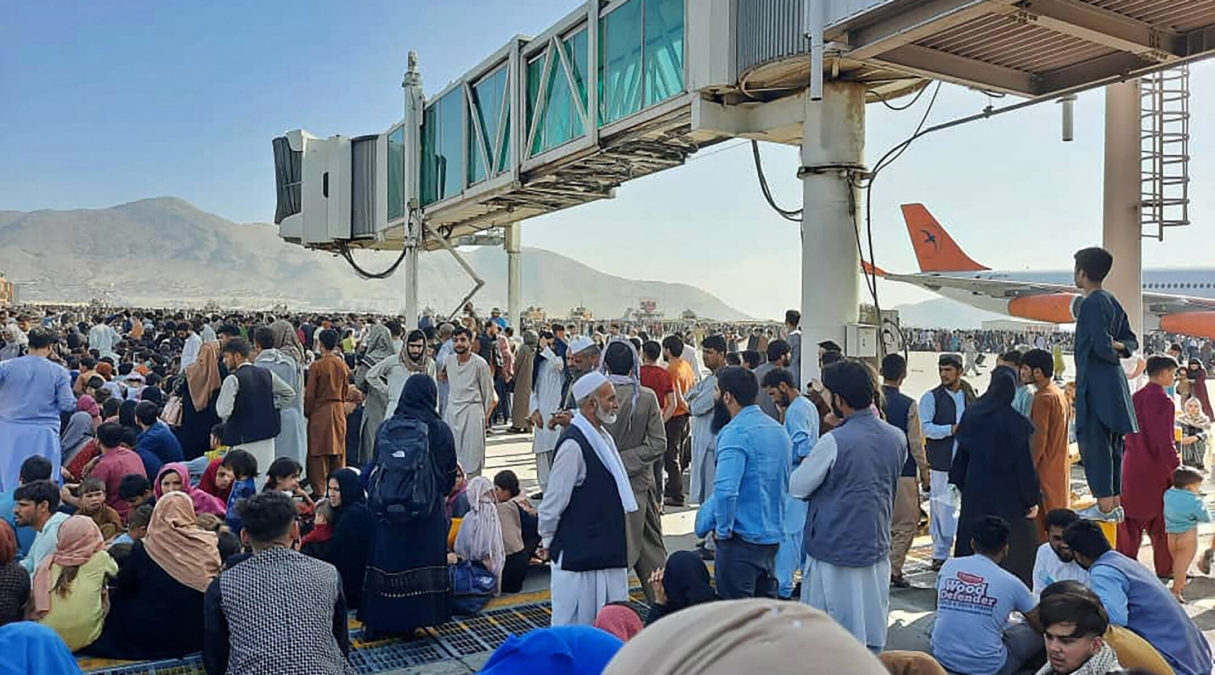
Banner

Taliban takeover more than just a threat to Afghans
Israel is bracing itself for renewed terrorism from the fundamentalist Taliban Sunni Muslim insurgency in Afghanistan.
Hamas was quick to praise the group’s takeover of the Afghan capital, Kabul, on 15 August, calling it “a victory that came as the culmination of more than 20 years of struggle”.
Jerusalem has chosen not to comment officially. However, many Israeli observers agree that the speed of the coup and the ensuing chaos that resulted in thousands of people desperately gathering at the capital’s main airport, some dropping to their death as they hung onto departing planes, sends a strong message to the international community.
That message is more pertinent for countries who consider themselves allies of the United States (US) – that they cannot rely on Washington in a military crisis.
“We have to understand the limits of the Western superpowers,” said Brigadier General Yossi Kuperwasser, an Israeli intelligence and security expert. “That’s why we should keep saying to ourselves that we have to be able to do whatever is necessary in order to make sure that we can defend ourselves by ourselves.
“I refer particularly to the issue that’s so contested – the Iranian issue. We have to be able to take care of this problem by ourselves because if the Americans are leaving Afghanistan just because they don’t want to pay any price, will they take Iran on when Iran poses a critical threat?”
The answer for Kuperwasser is an obvious no. And the message, he believes, extends to Israel’s relationship with the Palestinians.
“We have to be by ourselves and retain control of the territories that are critical for our security and not rely on any foreign forces like America or the North Atlantic Treaty Organisation [NATO], to come and take responsibility for our security. Like was suggested in the plan of [former US] President Barack Obama.”
Colonel Richard Kemp, a former British commander who led troops in Afghanistan, said current developments were a reflection of the American decision to scale down its role as a superpower.
“Washington is eager to cut deals with radical Islamist groups in Afghanistan and Iran in the hope that they will take care of the ultra-radicals like Al-Qaeda and the Islamic State and stop them from threatening the security of the West. But it’s not going to work,” he reflected.
On the contrary, the feeling in the region is that the collapse of the Kabul government will help terror groups in their efforts to attack American and Israeli targets around the world.
“We are concerned that radical Islamist groups are going to use this event as a reason for blowing wind in their sails. They are going to feel emboldened, and try to carry out more attacks and have more influence in the region.”
But there is one positive consequence. Retired Israel Defense Forces Intelligence Major-General, Amos Yadlin believes concerned countries might now reach the understanding that they must stick together in order to be more capable of confronting coming threats.
“The fall of Afghanistan could create space for Israel to strengthen defence ties with countries who may be looking for a more localised partner,” he said.
What happened this week shouldn’t have come as a surprise. Over the years, I have visited Afghanistan, once spending a stint embedded with the American army as part of the NATO-led International Security Assistance Force (ISAF) mission in the county. Soldiers had nicknamed ISAF “I Surrender, Afghanistan’s F###’ed”. I write this while looking at a magnet I picked up there, a duplicate of which I gave to my editors back home, “You sent me to Afghanistan, you bastards!”
I went on patrols with soldiers, once walking through a village where children came running after us. After we took a break and I took off my helmet, on recognising I was female, one of the boys came up to me and asked, “Ma’am, does your husband know you’ve left the house?”
When we weren’t with the troops, locals would tell us they always knew when soldiers were coming to inspect a village and would inform the Taliban, who were usually family members. They would, in turn, lie low and emerge again only after the troops had left.
So much money was being invested by the international community, but so little of it made it to ordinary Afghans. At one time, there were 6 000 non-governmental organisations (NGOs) registered in the country. It was admissible for them to spend up to 40% of their budgets on security, which in turn was provided by more than 120 international private security firms. In this way, money would return to the NGO’s home country, profit would line the pockets of a select few, and most of the Afghan population would be no better off than before.
Even more ludicrous, the security companies would pay the Taliban who were active in certain parts of the county not to attack the convoys they were protecting. I remember local journalists telling me that the US strategy in Afghanistan made no sense.
“NATO doesn’t seem to know whether it’s fighting a war or making a peace. Real development will take place only if there’s stability, which is exactly what NATO has demonstrated it cannot deliver for Afghans,” one prophetically forecasted.
There was a lot of patronising going on. Foreign troops often couldn’t distinguish between the Taliban and local villagers, and neither could the Afghan American translators they used who’d grown up in the US. We visited an airbase where American pilots were training their Afghan colleagues. One told me off camera that he would never let an Afghan pilot fly him because they were so bad. Later, while standing alongside each other, the American pilots were proudly demonstrating their important role in the country when an Afghan pilot boldly said in Russian so the Americans wouldn’t understand how he couldn’t wait for them to leave and give them all their equipment.
Since taking over the country, representatives of the Taliban have been appearing on international television in an effort to reassure the world that their return won’t be the nightmare scenario many in the West fear. They’ve gone as far as to brand themselves “the new Taliban”.
This week, a spokesperson for the group stressed that they would respect the rights of minorities, including those of the country’s last Jew, Zabulon Simantov. Although the spokesperson had never heard of Simantov, he said he had nothing to fear.
In June, Simantov, who lives in Kabul, vowed he would leave Afghanistan “by the time the Taliban come”. But on Tuesday, 17 August, he spoke to Indian TV, declaring that he wasn’t moving anywhere.
“I will not leave my home. If I had left, there would have been no one to maintain the synagogue.”
For 16 years, Simantov has been the only Jew living in Afghanistan after another Jew, Isaac Levi, died in 2005. Their relationship mirrored the well-known Jewish joke where a Jewish man is stranded on an island. When he’s found, he shows his rescuers the two synagogues that he’s built. Why two? “This is the one I go to,” he says, “and the other is the one I wouldn’t be caught dead in.”
Simantov and Levi never spoke to each other.
Without Simantov, the synagogue is likely to close, ending an era of Jewish life in Afghanistan that scholars believe began at least 2 000 years ago.











tanya silverman
August 19, 2021 at 12:30 pm
Unbelievable how much money NGO’s waste. what do they actually achieve after all their money is spent. Rather donate money to INDIVIDUALS that you can see with your own eyes and can see the effect of your help.
what an absolute outrageous situation.
But if Afghanistan wants the Taliban, they have them and good luck.